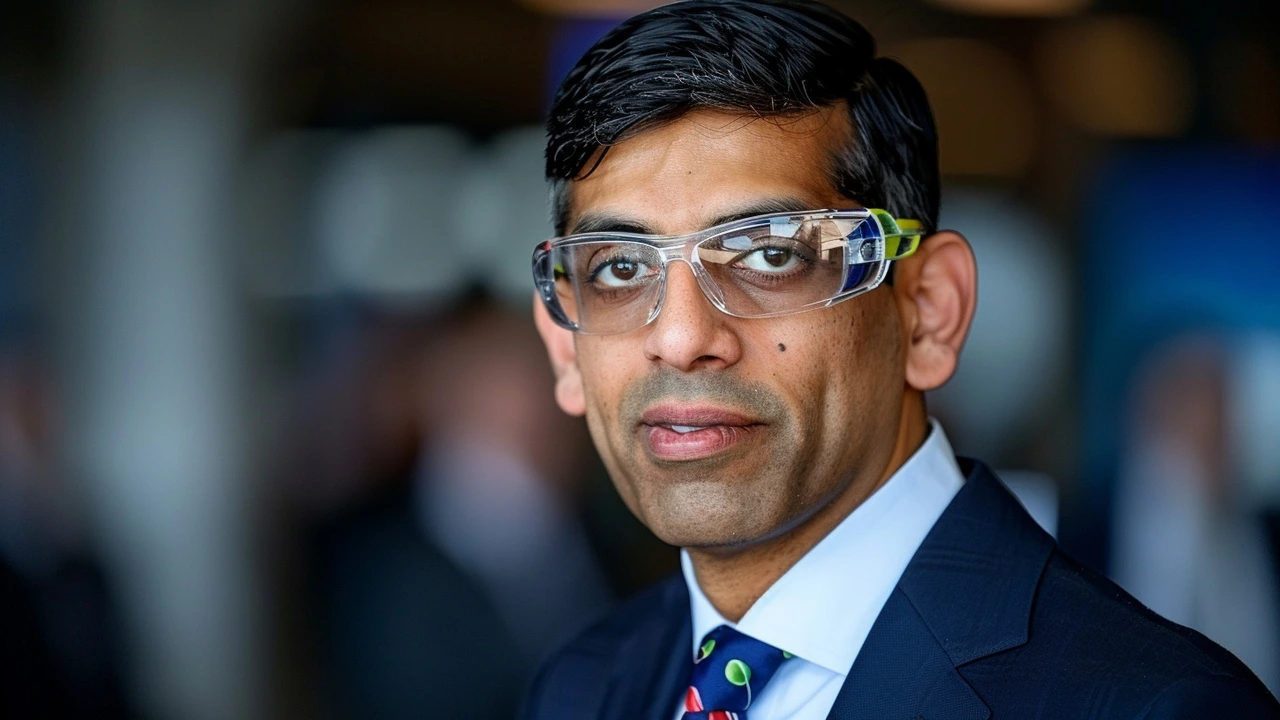Rishi Sunak's Ambitious Smoking Ban Shelved: Impact on Election Campaign
With the imminent general election casting a shadow over legislative activities, recent news of Prime Minister Rishi Sunak's disappointment is reverberating throughout the UK's political landscape. Sunak's proposal to gradually phase out smoking in England, envisioned through the comprehensive Tobacco and Vapes bill, has been shelved, much to his chagrin. Originally announced last year, the initiative aimed to create a 'smoke-free generation,' aligning with public health objectives while simultaneously stirring controversy within the Conservative Party, especially among its libertarian wing. The shelving of this proposal signifies a significant setback not just for Sunak but also for public health advocates who viewed the bill as a monumental step in tobacco control.
The Tobacco and Vapes bill was not an isolated legislative effort but part of a broader strategy aimed at reducing smoking prevalence in England. Among its key provisions were measures to gradually raise the legal age for purchasing tobacco. Complementing these were stricter advertising restrictions for vape products to curb youth access and usage. The highly anticipated bill encapsulated a progressive vision, posited as a solution to one of the UK's persistent health issues. Sunak's decision to push this agenda was indeed a bold one, reaffirming his willingness to tackle challenging issues head-on.
Political Ramifications of Shelving the Bill
Given the proximity to the general election, parliament is set to dissolve, creating a legislative hiatus. Several bills, including the Tobacco and Vapes bill, face the unfortunate reality of being put on hold. This legislative limbo not only dampens the spirits of proponents but also offers political ammunition to the opposition, particularly the Labour Party. Sunak, however, has remained resolute, defending his bold initiatives as necessary and forward-thinking measures. In a recent statement, Sunak highlighted successful legislation that had been passed, such as the Post Office Offences Bill and the Victims and Prisoners Bill, underscoring his administration's achievements despite the Tobacco and Vapes bill being sidelined.
Sunak's stance is not merely a reflection of his disappointment but an assertion of his commitment to controversial yet essential policies. His defense of the proposal and subsequent narrative concerning legislative successes illustrates a broader tactic to position himself as a decisive leader willing to embrace difficult challenges for the greater good. This narrative is undoubtedly designed to resonate with voters seeking steadfast leadership amidst an increasingly polarized political climate.

Challenges from Within and Beyond
The Conservative Party, historically a broad church with diverse ideological factions, has seen its libertarian members articulate strong opposition to the anti-smoking measures. Sunak's vision clashed with the libertarian values of limited government intervention, leading to internal discord. The intra-party controversy over the proposed smoking ban reflects a broader ideological struggle within the Conservative Party, highlighting the delicate balancing act Sunak must perform as he seeks to unify the party ahead of the general elections.
Compounding the internal challenges, Sunak also faces substantial external pressure. The shelving of the Tobacco and Vapes bill provides Labour leader Sir Keir Starmer and other opposition figures with substantive critique points. In a preemptive move challenging Starmer, Sunak called for TV debates, urging for transparent discussions about future plans. His call for debates underscores a strategic pivot, aiming to shift the public discourse toward accountability and comprehensive vision, areas where he believes his leadership can stand scrutinized.
A Glimpse into Electoral Strategies
Sunak's invitation to former Prime Minister Boris Johnson to join the Conservative campaign trail is a noteworthy development. Citing past collaborative successes, he welcomed Johnson's participation, suggesting that a united front might bolster the Conservatives' appeal among voters. Johnson's reputation and political acumen could potentially reinvigorate the party's base, crucially important as the election date looms closer. This decision indicates Sunak's willingness to leverage influential figures within the party to consolidate support and present a cohesive electoral strategy.
The shelving of the Tobacco and Vapes bill against the backdrop of the ensuing general election encapsulates the complexities of legislative priorities in the face of electoral pressures. While public health advocates express regret over the delay, Sunak's focus remains steadfast on legislative accomplishments and future readiness. His dual strategy of defending past legislative successes while calling for accountability in future debates encapsulates the nuanced political maneuvering required in the current landscape. As voters await the general election, the narrative surrounding the shelved smoking ban and the potential implications on election outcomes continues to unfold. The dynamic interplay between legislative initiatives and electoral strategies promises a riveting, albeit challenging, campaign season.
Further Implications for Public Health and Policy
The shelving of the Tobacco and Vapes bill, while politically charged, also raises important questions about public health policy in the UK. Advocates of the bill argue that delaying its passage could have prolonged public health consequences, potentially stalling the progress toward reducing smoking rates. The phased approach to raising the legal purchasing age for tobacco was particularly seen as a groundbreaking step toward safeguarding future generations from the harms associated with smoking.
Naysayers, particularly within the libertarian wing of the Conservative Party, argue that such measures infringe upon personal freedoms and autonomy. This ideological contention underscores the broader debate about the role of government in regulating public health. The bill's shelving, therefore, is not just a legislative delay but a microcosm of the ongoing debate about state intervention in individual choices.
From a public health perspective, the significance of the Tobacco and Vapes bill extends beyond immediate legislative outcomes. It serves as a litmus test for future health policies, highlighting the challenges and opposition such initiatives may face. For policymakers and public health professionals, the delay is a call to action to continue advocating for evidence-based policies that prioritize community well-being whilst navigating the complex political terrain.

Conclusion: Navigating Future Prospects
As the general election draws near, the shelving of the Tobacco and Vapes bill encapsulates the intersecting challenges of health policy and political strategy. Prime Minister Rishi Sunak's disappointment reflects a broader frustration among public health advocates committed to progressive tobacco control measures. Yet, his defense of the initiative and calls for future accountability debates signal a strategic recalibration, positioning himself as a decisive leader.
Ultimately, the intricate dance of electoral priorities and public health imperatives will continue to shape the UK's political and health landscape. As voters prepare to cast their ballots, the narrative around the shelved smoking ban and what it signifies for future governance remains a pivotal point of discussion. The unfolding electoral season promises to be a critical juncture for defining not just political leadership but the future direction of public health policy in the UK.

6 Responses
It is both astonishing and predictable that a government so eager to brand itself as a champion of public health would abandon a flagship anti‑smoking initiative at the very moment the nation is fixated on electoral theatrics. The timing of the shelving, merely weeks before Parliament dissolves, underscores a tacit acknowledgment that electoral calculus trumps evidence‑based policy. One might argue that the pursuit of a 'smoke‑free generation' is a noble aspiration, yet the pragmatic realities of coalition dynamics render such aspirations fragile. Within the Conservative Party, the libertarian contingent perceives any intrusion into personal liberty as anathema, thereby weaponising the policy as a rallying cry against perceived state overreach. Simultaneously, public health advocates are left to contemplate the opportunity cost of delayed implementation, measured not merely in lost lives but in the erosion of momentum for future reforms.
From a philosophical standpoint, the episode illustrates the perpetual tension between the collective good and individual autonomy, a dialectic that has animated political theory since antiquity. When elected officials prioritize short‑term electoral gains over long‑term societal benefits, the social contract itself appears compromised. The irony is palpable: a leader who proudly touts successes such as the Victims and Prisoners Bill now discards a measure that could have saved countless future citizens from nicotine addiction. Critics may dismiss the smoke‑free agenda as paternalistic, yet history repeatedly demonstrates that well‑crafted public health interventions yield net positive outcomes. Consider the decline in smoking prevalence following the introduction of plain packaging and advertising bans; the same principle could have been extended through age‑graduated access restrictions. Moreover, the incremental raising of the legal purchase age would have aligned with global trends toward protecting youth, a demographic unfortunately susceptible to targeted marketing. In the broader scheme, the decision to shelve the bill sends a discouraging signal to advocates who have laboured tirelessly to translate scientific evidence into legislative action. It also equips opposition parties with ammunition to portray the government as inconsistent, thereby fracturing any semblance of a unified narrative. Nevertheless, one must acknowledge that governance is an exercise in compromise, and the ability to navigate intra‑party dissent remains a hallmark of effective leadership. The real question, however, is whether this compromise merely postpones the inevitable or consigns the initiative to oblivion. In any case, the electorate will soon be tasked with judging the merit of such trade‑offs, and perhaps the ultimate verdict will be rendered at the ballot box rather than in the legislative chamber.
Honestly, it's like the elites are pulling the strings behind the scenes, making sure we never get a real smoke‑free future. They’ll tell us it’s about elections, but we all know it’s about keeping the tobacco lobbies flush with cash.
The government just pretended to care, but deep down they're all part of the same conspiracy that keeps us addicted. I mean, why would they shelve a plan that could actually save lives unless they're trying to distract us with drama and endless promises? They're definitely definetly up to something, and it's not just about politics.
Great reminder to stay informed and keep pushing for healthier policies!
In the shadows of complacency, the soul of a nation flickers, yearning for the breath of true liberty. Yet the weight of apathy smothers any whisper of reform.
Wow!!! This whole situation is a roller‑coaster of emotions!!! 😱💨💔 We need to keep the momentum going, folks!!! 🌟🚀 Let’s not let politics kill progress – every breath counts!!! 🙏❤️✨
Oh sure, because shelving a public‑health bill is the perfect way to show you care about voters’ lungs, right? 🙄 The irony could fill a stadium, and the tobacco lobby will probably throw a party in thanks. Anyway, enjoy the campaign glitter while the smoke lingers.